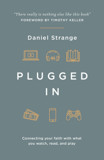
The following piece is an adaptation of the foreword to Dan Strange's new book, Plugged In.
I once heard one of my professors tell a story about Paul Tillich, a German theologian who was prominent in academic circles. When my professor was a young faculty member at a seminary in the United States, he was given the task of moderating the discussion after a public lecture by Tillich. Students began asking questions, but each time, the guest lecturer completely reformulated and “corrected” the question before answering it.
Finally my professor summoned some courage and said, “Professor Tillich, that wasn’t really the student’s question. Could you answer the question the student actually asked?” The response was quick and withering: “No, because they aren’t asking the right questions.”
Maybe that was partly true, my professor concluded, but the result of this tactic was that the students completely tuned out and dismissed Tillich.

Enjoy culture in a way that feeds your faith and helps you share it with others.
In Plugged In: Connecting Your Faith with What You Watch, Read, and Play, Dan Strange knows that contemporary Christians are a lot like that ineffective lecturer. We believe “Jesus is the answer,” but we are so deaf to the cultural forces around us that we often present him as answering questions that people are not asking. Of course, because of sin, human beings do fail to ask the most fundamental question of all: How can I, a sinner, be made right with a holy and just God? And yet, as Dan shows in this book, the image of God in all people and common grace mean that people also ask some right questions: Who am I? What is meaning in life? How can I find true joy and fulfillment?
Every culture produces “texts”—things to watch, read, and play—that are based on answers to those big questions. Dan Strange shows us, in the most accessible way I’ve ever seen, how to do Christian cultural analysis. That is, he shows us how to identify the culture’s particular answers to those big questions in any text. Then he demonstrates how to both critique those answers and yet affirm the basic aspirations, and finally how to redirect people toward Christ as the true fulfillment of their quests and the true answer to their questions.
The basic method used here is one formulated by some 20th-century missiologists. The name “subversive fulfillment” perfectly describes the approach. Christians are to show members of other religions and worldviews that the gospel fulfills basic human longings and aspirations, but at the same time they are to critique the false idols in every culture that people think will satisfy those longings. Subversive fulfillment avoids the twin errors of syncretism and irrelevance. Sin must not just be denounced in general, but in the particular idolatrous forms found in the culture. Salvation must not just be declared in general, but as fulfilling the specific hopes the culture wrongly puts in its idols.
Subversive fulfillment avoids the twin errors of syncretism and irrelevance.
In Plugged In, Dan Strange takes this method, brings it into the 21st century, and makes it wonderfully useable for any reader. Dan convincingly shows that this is the way Paul preached. But the approach isn’t merely a strategy for evangelistic conversations (though it certainly is that). Dan shows it’s also a way for Christians to understand the world they live in and the cultural texts coming at them every day, so that they can live faithfully “in the world but not of it.”
Even more, Dan is calling for subversive fulfillment to pervade our approach to all our communicating—in public preaching and teaching, personal shepherding, instructing, and conversing. It means never simply beating on people from the outside, saying, “I am right and you are completely wrong.” Nor is it merely a way to show how up-to-date and relevant Christianity is. It involves both respecting and contradicting. It means challenging people, but showing them that their efforts fail on their own terms. And it means offering them, on gospel terms, what all human hearts need—a meaning that suffering can’t take away; a satisfaction not based on circumstances; a freedom that doesn’t destroy love and community; an identity that doesn’t elude you, crush you, or lead you to exclude others; a basis for justice that doesn’t turn you into a new oppressor; a relief from shame and guiltwithout resorting to relativism; and a hope that can enable you to face anything with poise, even death.
There are now plenty of books calling us to find new ways of connecting our gospel presentation to the needs and questions of people in a secular, pluralistic society. And there are plenty of other books calling for us to live faithfully in a post-Christian Western culture, neither simply withdrawing nor assimilating into it. But Plugged In actually tells and shows us how to do it. There really is nothing else like this book.
Plugged In will equip you to engage with culture and use it for God. Buy it here.